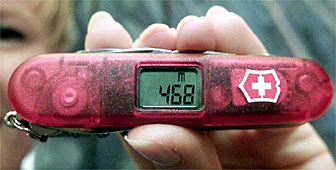Faking Swiss in Africa

Watches with top Swiss brand names like Rolex and Omega, Swiss army knives and Nestlé foods are some of the many counterfeit goods on African markets.
Numerous Swiss products are being copied illegally in Africa despite domestic legal measures to counter the practise.
Senegal’s courts are reviewing a case brought by Swiss food giant Nestlé against the Senegalise Trading Company. The process was initially scheduled to start in November, but has been postponed indefinitely.
The case highlights the gravity of counterfeit activity in Africa. The streets and markets of big cities are filled with Swiss imitation goods.
Extensive and cheap
“The extent of this trade is not quantifiable,” said Jean-Jacques Lautenegger, consul at the Swiss embassy in Dar es Salaam, Tanzania. Asian countries like Taiwan, Hong Kong and China, as well as Far Eastern countries are considered to be the African markets’ suppliers.
Manual labour is cheap in these countries and so the cost of goods is a lot less than in the original country like Switzerland, for example. “The modest income earned by the majority only allows them to purchase imitations of the real thing,” Leutenegger said.
Spillway
Africa is the “spillway” for counterfeit goods, said Doudou Sagna, an official at the African Organisation for Intellectual Property. African countries have neither the practical nor human material needed to eradicate contraband goods from the shelves, Sagna said.
In Tanzania for example, the law punishes counterfeiting and the sale of imitation products. However, it has never been applied because it is a “long and costly” procedure.
Furthermore, a verdict in the prosecution’s favour is not guaranteed to end the practice.
Equally in Morocco, fake Swiss goods abound in the markets of major cities such as Rabat, Casablanca and Agadir. According to Claude Duvoisin, consul at the Swiss embassy in Rabat, the Swiss watch industry is the most affected.
Swiss industry, together with the Swiss embassy in Rabat and the Swiss-Moroccan Chamber of Commerce, have tried to combat the practise but their efforts have yet to bear any fruit.
Senegal has signed an agreement with the African Organisation for Intellectual Property which protects industrial brands.
At the beginning of the year, Senegalise police seized more than 13,000 fake Bic razors, following a complaint from the French company.
In September 2000, police chiefs from 16 West African countries agreed to combat the counterfeit of industrial goods as well as intellectual property which they deemed a “trans-national crime”.
swissinfo with agencies

In compliance with the JTI standards
More: SWI swissinfo.ch certified by the Journalism Trust Initiative
You can find an overview of ongoing debates with our journalists here. Please join us!
If you want to start a conversation about a topic raised in this article or want to report factual errors, email us at english@swissinfo.ch.